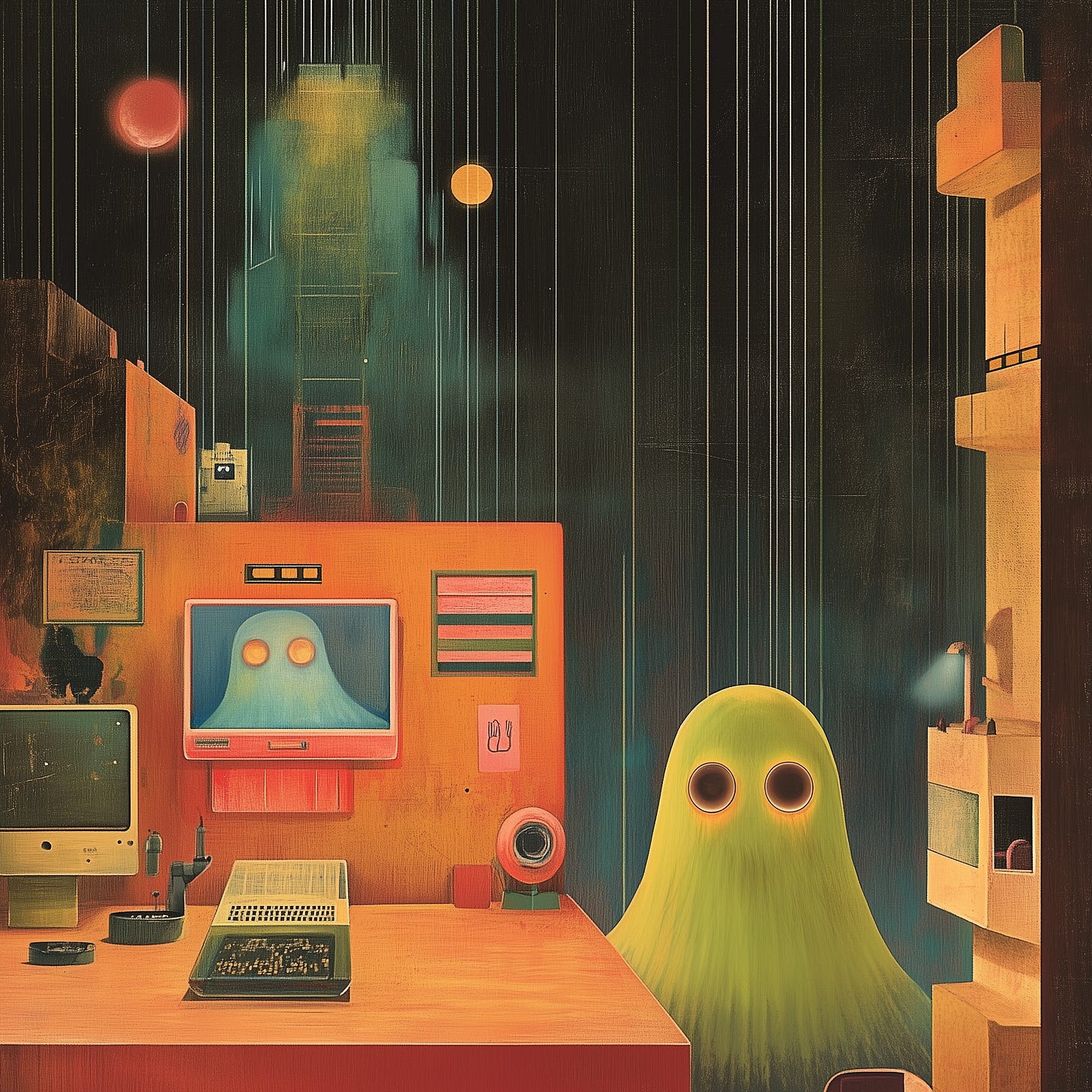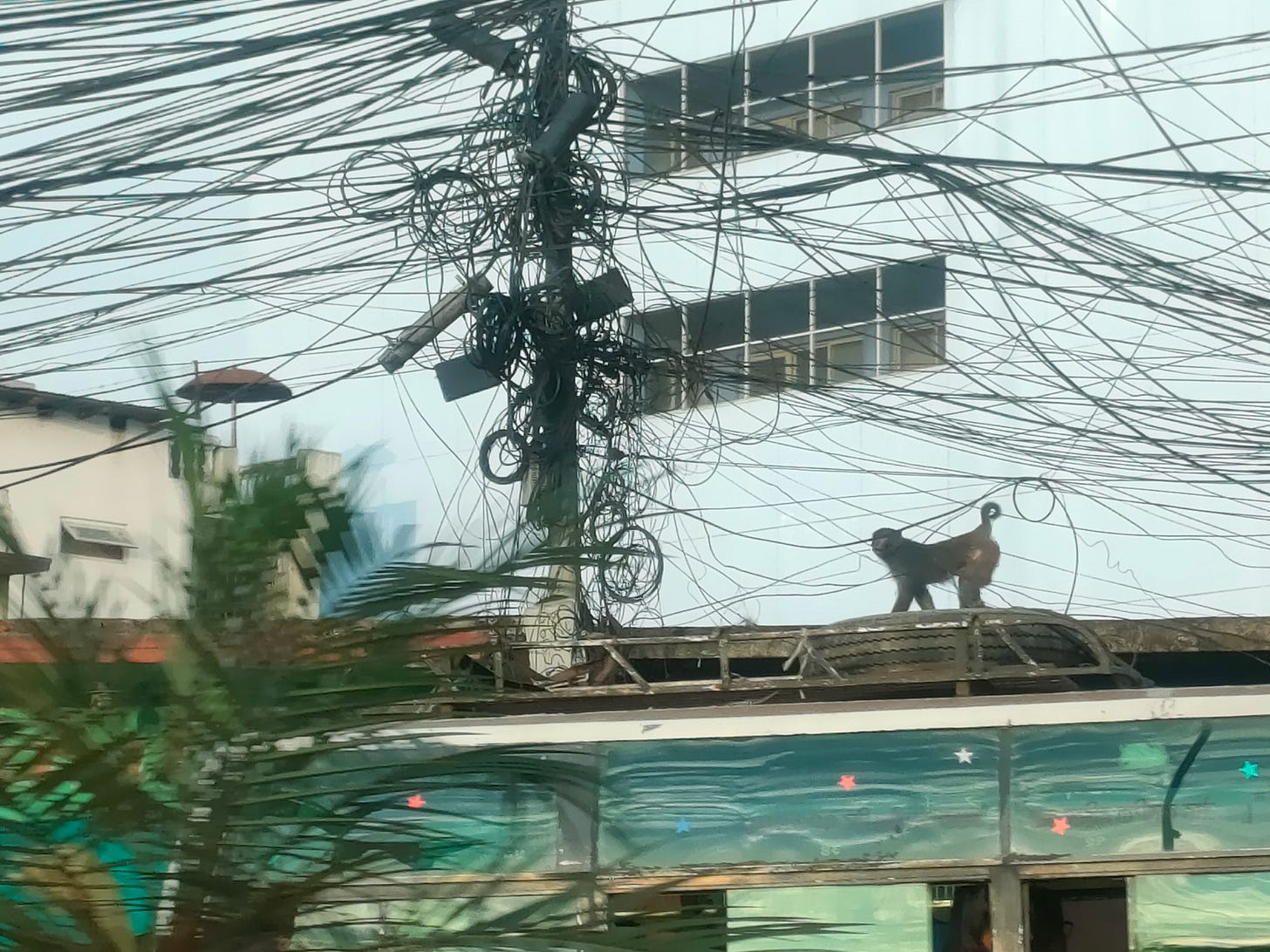Ghosts in Machines
Contest is closed and the judging process is underway. Want to help select the winners? Beam over to #🧑⚖️-contest-judging on Discord to vote.
Contestants should receive a decision by August 8th, 2025.
Guidelines
The idea of this contest is to imagine many futures full of distributed AI, connected through protocols of all sorts, including current real protocols in development such as MCP and A2A, blockchain protocols, existing mature protocols, and of course, entirely speculative new protocols.
But we want you to try and stick to 5 guidelines that we think will help generate a much more interesting crop of stories.
1) Imagine a Digitally Haunted Future
We want you to tell stories set in a world that feels like a landscape haunted by ghosts in machines — both plural.
Besides some older classics, such as Iain M. Banks’ Culture novels, and the Sirius Cybernetics devices, appliances, and robots in Hitchhiker’s Guide to the Galaxy, here are a few stories you may not have encountered, which get at some of what we’re looking for (thanks to our Consulting Editor, Qiufan Chen, for suggesting these):
Good Hunting by Ken Liu (China)
The Crystal Goblet by Jeronimo Monteiro (Brazil)
The Violet's Embryo's by Angelica Gorodischer (Argentina)
The first is the basis for an episode of the Netflix show Love, Death, and Robots, and the latter two can be found in this anthology
We want stories about embodied and disembodied agents, both dumb and smart, haunting the technological infrastructures of the world, creating a techno-animist zeitgeist, and strange new rules for humans and technologies to interact with each other.
2) Think Beyond Robots and Centralized AIs
While robots are great to put in your story, don’t limit yourself to robots as classically imagined! Or even to physically embodied robots! How about a digital spirit that can hop from appliance to appliance?
Distributed AI and protocols combine to create a much larger technological design space with many other possibilities. This doesn’t mean you have to studiously avoid robots if you really love writing robot stories; it just means you have to do something interesting and new with them that engages with the possibilities of distributed AI and protocols. For example, Futurama, despite superficially presenting a rather conventional 1950s style Asimovian robotic future, actually manages to cleverly subvert and expand the possibilities of such futures. For example, there is a robot hell with a robot devil, a form of disembodied robotic haunting, mind-swapping, robots going on spiritual quests, appliances that are robots in unexpected ways, and so on.
Similarly, while you can include the commonly imagined sorts of grand planet-scale centralized AIs in the story (think Skynet), the focus should be on a distributed, multi-agent AI futures and worlds, with a particular emphasis on smaller AIs, networked with each other in interesting ways (not necessarily in the familiar “internet” style connectivity we’re used to).
If you do include big, centralized AIs in your story, as with robots, do something creative and original with them.
3) Keep it Realistic!
The ghosts in machines we’re thinking of must be real! They must be the result of particular sorts of plausible digital technologies that can be imagined without breaking known laws of physics. We do not want stories about supernatural forces and beings (though humans or machines who believe in supernatural forces and beings might be interesting)!
But realistic doesn’t have to mean dark, gritty, and overly technically specified. You can use technologies that might plausibly be invented in the next century, even if they don’t exist now, and you don’t personally know what it might take. For example, fusion energy is a plausible technology to include, even though most of us have no idea how practical fusion reactors might work.
We also highly encourage you to look for real-world inspiration in the current state of technology.
For example, here is a picture of a monkey on a rooftop in Nepal (ht Stanley Chen), contemplating a dense maze of wires and cables at a junction. Is there possibly an interesting ghosts-in-machines story idea here?
Here’s another picture (ht Sachin Benny) — a web of optic fiber cables left behind by FPV drones in the Ukraine conflict (these are used to avoid jamming by electronic countermeasures). A ghostly record of a new kind of war. Is there perhaps a story here?
4) Evoke a Planetarity!
Your story should evoke an entire planetary condition, but without heavy-handed and didactic world-building. Your characters don’t have to be globetrotters, but the story should evoke a sense of the planetary. Your story doesn’t have to feature plants and animals in starring roles, but it should have a sensibility that extends beyond the human.
But you don’t necessarily have to imagine such a world yourself. Feel free to use existing worlds imagined by others (so long as they’re suitably open sourced, and not bound by copyright — no fanfiction around heavily defended IP please).
For example, you might ponder the ideas about planetarity being explored by our friends at the Berggruen Institute.
Here’s one you specific speculative planetarity you might want to consider using:
We imagined one ghosts-in-machines future world, titled South Beast Asia, at the recent SoP workshop in Bangkok, and made an AI-assisted short film about it, comprising a bunch of short vignettes. Here’s a 3-minute trailer.
You can watch the full 25-minute film here.
For extra tips and inspiration, rewatch our panel discussion about South Beast Asia, along with a short writing class by Qiufan Chen:
You are highly encouraged to set your story in South Beast Asia (the website has a lot of interesting world-building resources), or similar unusual global setting with an interesting naturally distributed/fragmented backdrop, but it is not required.
5) Transcend Utopian/Dystopian
This one is admittedly a hard challenge. We want you to write a story that is hard or impossible to classify as “utopian” or “dystopian.” More broadly, try to tell an interesting story first, moralize/sermonize second (or ideally, never).
While it’s fine to adopt a morally opinionated tone in your storytelling, don’t let it turn into a morality tale or sermon. Consider strategies like transferring your moral opinions to a character and putting that character through interesting and unexpected challenges instead, to explore the implications of that moral stance.
Ideally, some of your readers will find the story utopian, some will find it dystopian, but the majority won’t know what to think, but find the story intriguing anyway. They will find the world interesting enough to want to explore, or perhaps even help bring about and live in, perhaps despite the strange and discomfiting challenges it presents for its inhabitants.
In summary:
Imagine a digitally haunted future
Think beyond robots and centralized AIs
Keep it realistic
Evoke a planetarity
Transcend utopian/dystopian
Besides these 5 contest-specific guidelines, as usual, keep the two overarching principles of this magazine in mind:
Chiang’s Law: Fantasy is about special people, science fiction is about special rules. We want science fiction.
Fred Pohl Rule: The job of the science fiction writer is to imagine not the automobile, but the traffic jam.
Contest Details + Logistics
Your mission: tell an entertaining and thought-provoking tale that creatively explores a ghosts in machines future.
Length: 1500-3000 words
Format: Send your story as a public Google doc, a ~100 word synopsis, and if applicable, your “writing with AI protocol” to research@summerofprotocols.com
Submission Deadline: Midnight, Sunday July 13th
AI use: You are encouraged to use LLMs to help you write your story, in which case, please document the protocol you use as an endnote to your submission.
Acknowledgments: If you derive inspiration from existing ideas or world-building projects (such as Southbeast Asia), please note them in your submission with suitable links.
Prizes: The top three stories will be eligible for publication in Protocolized in addition to a cash prize (1st - $2500, 2nd - $2000, 3rd - $1500). Additional finalists, from places 4th to 10th, could be offered our standard $750 for a commissioned piece.
Judging: Decisions will be made by an internally constituted jury, with advisory input from a broader voting phase.
Need some brainstorming support? Join the contest channel on our Discord and swap ideas and notes with fellow competitors!
Please review our standard submission guidelines page for some extra tips. We encourage you to make creative use of LLMs to compose your story (in which case we ask that you document and submit your “writing with AI” protocol along with your entry).
Check out past editions of Protocolized here.
Good luck!




